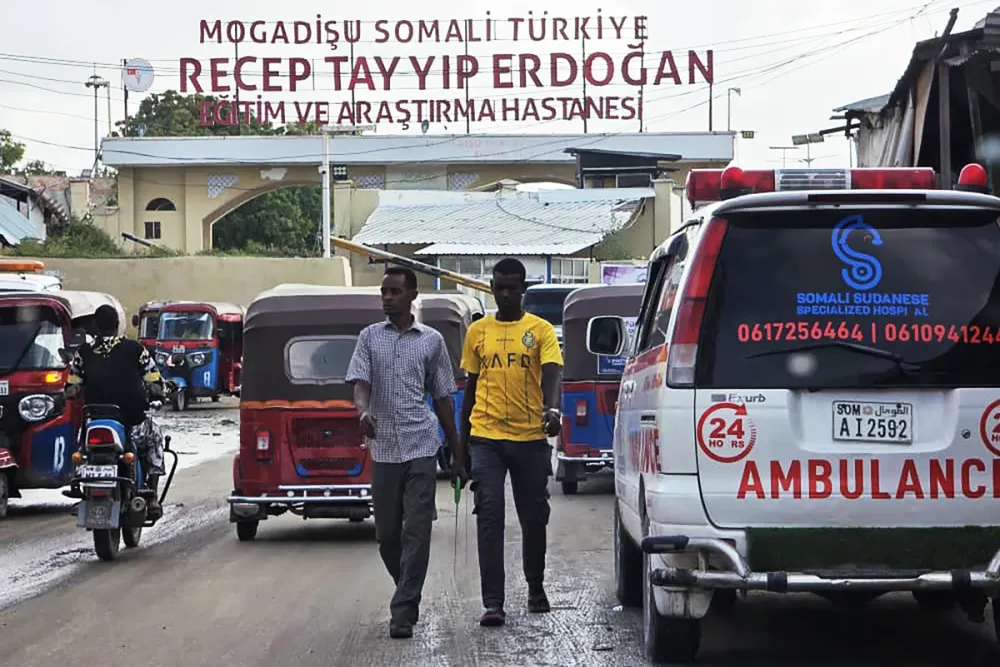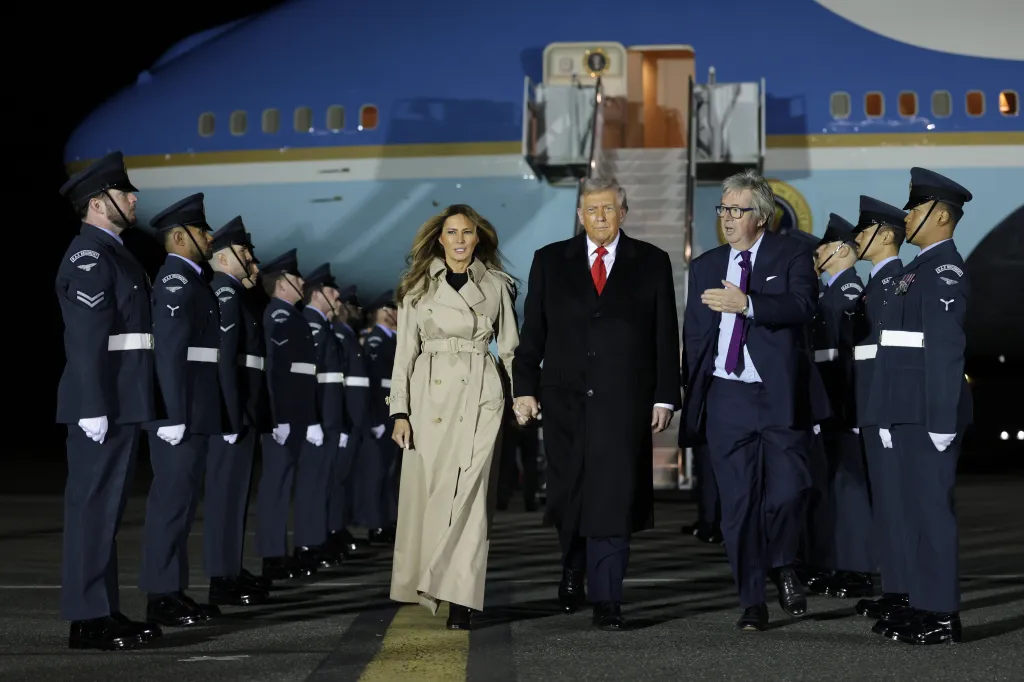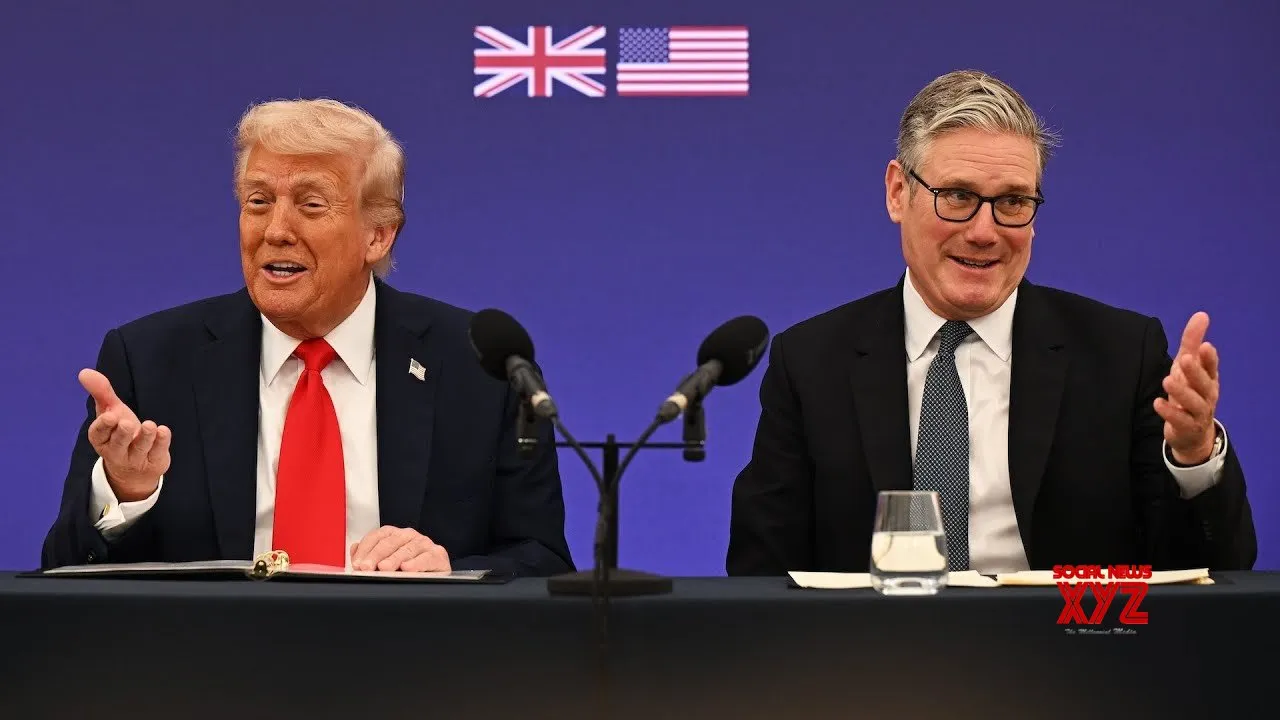
As 50-year-old Mohamed Ahmed Nur departed his home in the town of Quracley in Somalia’s Hiiraan region on Jan. 30, 2023, he recalled seeing drones hovering overhead but didn’t think much of it. Drones had become a common sight in the al- Shabab-controlled town.
Nur was at a funeral in a nearby district when news of the strike reached him later that day. He rushed back to a scene of horror.
“I saw charred remains of my children and other youth smoldering,” Nur told Foreign Policy in March. “Their remains were scattered around the tree.”
A few al-Shabab fighters were present when he arrived, Nur said. They looked to be trying to confirm the identities of those killed in the strike. Once it became clear that the victims were not fellow combatants but young boys, they left.
Nur then called for help to collect the remains.
“A total of 12 people arrived, and then they helped me pick up the body parts, one by one. Then we placed them in sacks,” he said. “I couldn’t even wash my children’s bodies according to the Islamic rulings when dealing with the deceased, because the bodies of my children were ripped to pieces.”
Seven young people were killed in the drone strike; five of those victims were minors. The deceased included three of Nur’s sons: 20-year-old Ahmed Mohamed Nur, 18-year-old Abdulkadir Mohamed Nur, and 8-year-old Qays Mohamed Nur. Mohamed’s 17-year-old nephew as well as a 13-year-old, 14-year-old, and 11-year-old also died in the drone strike.
Turkey is waging a drone war against al-Shabab in Somalia from a joint command with Somalia’s intelligence agency. (The United States and United Arab Emirates are also involved in Somalia’s drone operations.) It carries out drone strikes at the behest of Somalia’s National Intelligence and Security Agency (NISA), with Somalia’s NISA feeding Turkey intelligence on targets, and Turkey then carrying out the strikes. According to two senior Mogadishu-based Somali intelligence officials, the strike on Quracley followed this process. (Officials spoke on the condition of anonymity because they weren’t cleared to speak with the press.)
In the time since the Quracley strike, the Turkish government is alleged by locals to have carried out more airstrikes in Somalia that have resulted in civilian casualties. The use of Turkish drones both by the Turkish government and states backed by Ankara has spread across Africa, to the Sahel region, Libya, and even Ethiopia.
In Somalia, what began in 2011 with a humanitarian intervention to save lives during a famine has since seen Turkey become deeply entrenched in the country’s security infrastructure. And amid Turkey’s deepening war against al Qaeda’s most powerful ally, al Shabab, civilians are paying the ultimate price.
“The nearest al-Shabab outpost is 2 kilometers away, but they still got bombed,” Nur said. “My children didn’t deserve this.”
For Turkey, the 2011 famine in Somalia that killed some 250,000 people was a pathway into the strategically significant Horn of Africa, and soon thereafter, Turkish aid groups, organizations, and companies would flood the country.
“What began as authentic soft power undeniably evolved into something far more strategic,” said Jethro Norman, a senior researcher with the Danish Institute for International Studies. “Somalia is clearly a node in Ankara’s larger geopolitical ambitions—what has been called its neo-Ottoman aspirations to reassert Turkish influence in the Horn of Africa and Red Sea region.”
As Turkey began propping up the government in Mogadishu, it found itself getting more embedded in the Somali government’s war efforts against al-Shabab. Turkey sees groups such as al-Shabab not only as a threat to its own interests in the country but also as a threat to its governmental allies in Mogadishu, where an internationally recognized but fragile government has been bogged down in a nearly two-decade war against the insurgents.
Al-Shabab has responded ferociously to Turkey siding with the Somali government, with a spokesperson saying that “NATO is the biggest enemy of Muslims and Turkey is a part of it. NATO is a union of Christians.” The group’s suicide bombers have targeted Turkish Embassy staff; attacked a convoy of Turkish engineers tasked with building roadways; and, most recently, killed a Turkish aid worker engaged in humanitarian work.
Turkey sees the survival of the government in Mogadishu as key to securing its interest in the country and the wider region. In April of this year, when fears grew that the government in Mogadishu would be toppled as al-Shabab advanced on the capital city, Ankara responded by deploying nearly 500 troops to the capital. They were tasked with protecting Turkey’s assets in the country, such as its largest overseas military base, located in the Mogadishu seaport; the deployment included Turkish security personnel operating armed drones.
Turkish influence has spread throughout all sectors of Somali life. Ankara has opened up Turkish schools with Turkish charities and nongovernmental organizations while Turkish companies build roads, hospitals, and orphanages. The government in Ankara has also provided thousands of Somali students with scholarships to study in Turkey.
Added to the mix are Turkish firms that have secured managing rights over vital state infrastructure. In 2013, Favori LLC, a Turkish state-backed company, won a 20 year lease to run the Mogadishu airport, and in 2014, the Ankara based Albayrak Group secured a 20 year lease to manage Mogadishu’s seaport.
Serious questions remain unaddressed in Turkey’s stealth takeover, particularly regarding profit-sharing, local employment, longer-term control, and sovereignty over state assets. In 2024, Somalia’s attorney general accused the Turkish firms managing the Mogadishu airport and seaport of violating profit sharing agreements.
Both firms failed to submit required financial reports after independent audits. This made it impossible for Somalia’s government to confirm rightful shares of revenue generated by these key state assets and, according to the Attorney General, risked the potential loss of millions that could be crucial to Somalia’s economic growth.
Turkey’s geopolitical domination of Somalia is not only limited to economics but also extends to Somalia’s security affairs. In 2017, Turkey established its largest overseas military base in the capital, training thousands of Somali troops in the years that followed to take part in the war against al-Shabab. Aside from its own drone warfare, Ankara has provided the Somali government with helicopters and boots on the ground, including the deployment in April.
Turkey has become the fourth largest arms exporter to sub-Saharan Africa. With drone exports accounting for a significant portion of Turkey’s arms sales, Bayraktar and Akinci drones have become readily accessible to governments in the Sahel region and the Horn of Africa.
A lack of transparency around drone attacks conducted by Turkey can play into the hands of the armed groups that these drone strikes target, as the groups exploit public backlash and sentiment from suffering communities.
In 2024, Amnesty International released a damaging report alleging that the Turkish government may have committed war crimes in Somalia after Turkish drones bombed a farming settlement, killing 23 civilians, including 14 children. Turkish munitions were later found at the site of the drone strike, implicating Ankara in the mass killing.
Despite this, there has been no accountability for this strike or the strike on Quracley. This is partly because when drone strikes occur in Somalia, they often will happen either in al-Shabab-controlled areas or no-man’s-land—areas in the country where neither al-Shabab nor the government have full control and where the rules of engagement are often nonexistent.
“Turkey’s drone operations in Somalia indicate a broader global shift in drone use, highlighting how drone warfare is no longer just a tool of American foreign policy, but increasingly central to Turkey’s international strategy as well,” said Norman. The researcher calls this a kind of “drone diplomacy”: a dangerous convergence of lethal technology, geopolitical ambition, and arms sales.
For Turkey, this represents a crucial component of a wider strategy to diversify energy sources, enhance its geopolitical leverage, and project power beyond its traditional sphere of influence.
“As a weaker country with significant security risks, Somalia often has to do more to attract external investment, which can mean offering favorable terms,” says Omar S. Mahmood, a senior analyst on Somalia and the Horn of Africa for the International Crisis Group.
In 1993, British economist Richard M. Auty coined the term “resource curse” in reference to how resource-rich countries often develop more slowly, corruptly, and violently. Somalia is no different. The deepening of Mogadishu’s dependence on Ankara is giving Turkey significant leverage over Somali affairs, as well as keeping potential rivals at bay.
In 2024, Turkey inked an oil exploration agreement with Somalia for offshore oil blocks. The following year, Turkey signed another oil exploration agreement with Somalia, this time for onshore oil blocks.
“Turkey’s security support for the Somali government likely ties into its overall strategy,” Mahmood said. But as the Somali government lacks a monopoly on the use of force across the country, and the vast majority of Somalia is not governed by the internationally recognized government in Mogadishu, the state has come to rely on external drone warfare to combat perceived threats.
Abdiwahid Abukar, who drives a minivan ferrying passengers between the al-Shabab- controlled town of Mubarak and the government-controlled town of Afgoye in Somalia’s Lower Shabelle region, was caught up in a Turkish drone strike on Sept. 9, 2022.
That day, Abukar was among dozens of lorry drivers and hawkers taking part in a meeting at a bus station in Mubarak to handle a labor dispute. As sunset neared, the meeting was targeted in a strike—apparently another from a Turkish drone.
Once the smoke cleared, corpses were strewed out on the dirt floor, and wounded people screamed for help. Nine people were killed, and 17 others were wounded. It took Abukar many months to recover.
Foreign Policy reached out to the Turkish Embassy in Mogadishu, Turkey’s director general for East and North Africa from the Ministry of Foreign Affairs, the deputy directorate general for information at the Ministry of Foreign Affairs, and Turkey’s special representative to Somalia and Somaliland regarding the alleged Turkish strikes targeting Quracley and Mubarak but did not receive a comment.
As Turkey becomes more entrenched in Somalia, strikes from its drones are likely to increase as the war with the al Qaeda affiliated armed group al-Shabab continues. Ordinary civilians like Abukar will pay the price.



